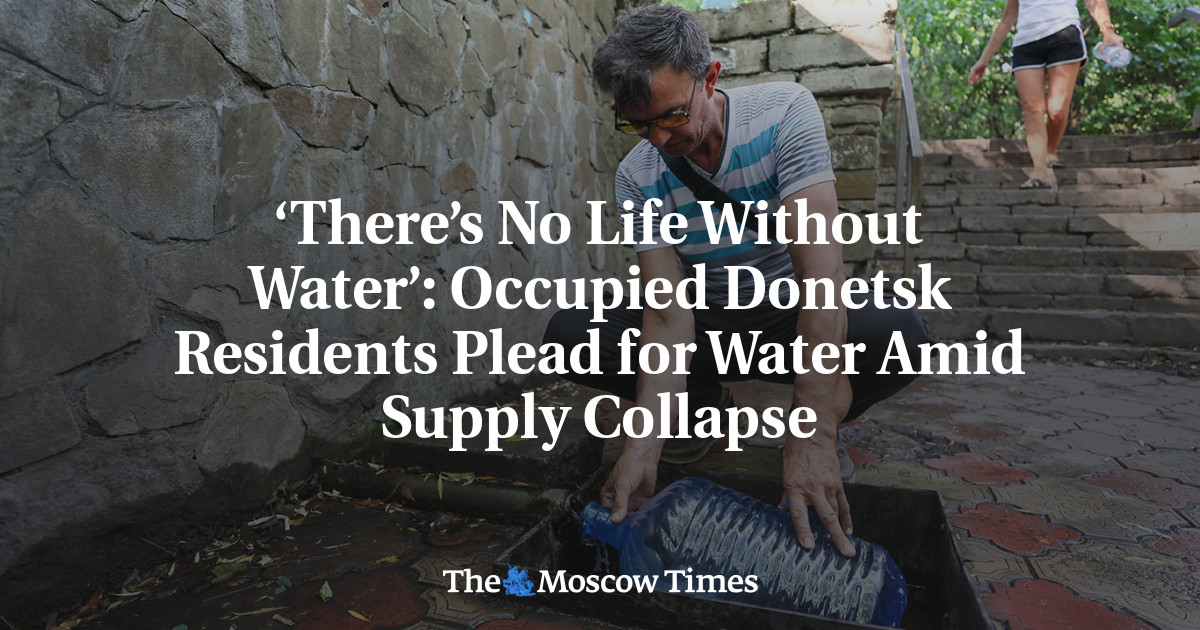
‘There’s No Life Without Water’: Occupied Donetsk Residents Plead for Water Amid Supply Collapse
How did your country report this? Share your view in the comments.
Diverging Reports Breakdown
‘There’s No Life Without Water’: Occupied Donetsk Residents Plead for Water Amid Supply Collapse
Problems with water access have plagued Donetsk residents since 2014, but the region’s water crisis has become especially acute in recent weeks. Russian-installed authorities introduced a strict schedule for water supply in Donetsk and the nearby city of Makiivka this month. Water available once every three days, for just four hours, from 5 to 9 p.m. In Mariupol, Khartsyzk and Ilovaisk, water is supplied once every two days, also for four hours. Local residents complain that low water pressure means that water often does not reach above the second or third floors of apartment buildings. “People carry buckets down to the basement and take turns collecting this water — just enough to flush the toilet. You can’t cook with it, wash with it or even brush your teeth,” said a post showing yellow tap water published in Donetsk Vesti DNR, a pro-Kremlin group on the VKontakte social media site. The BBC analyzed satellite imagery of 10 local reservoirs and found that nine of them have significantly shrunk since the start of the war.
A view of the dried up Khanzhenkovskoye Reservoir in the village of Nizhnyaya Krynka. Dmitry Yagodkin / TASS
The same VKontakte group posted a video of murky brown water running from the tap on Monday. “According to statements from the Sanitary and Epidemiological Service…the tap water in our cities ‘fully meets all quality standards’ and is officially classified as drinking water,” the post said ironically, adding that residents are “being charged for it as if it were actually drinkable.” Local residents also complain that low water pressure means that water often does not reach above the second or third floors of apartment buildings. Outside the official supply hours, residents are forced to rely on water delivery trucks with limited availability or pay steep prices for bottled water. Local resident Maryana told the RTVI broadcaster that her family needs “two 40-liter canisters and about 20 plastic bottles” to survive for two days. “The water truck arrives and we fill up. Our arms and legs are shaking, but we’re happy we managed to get some water,” she said of the process of collecting water. Denis Pushilin, the Kremlin-installed head of the Donetsk region, last week even instructed the local government to cap bottled water prices at 3.5 rubles ($0.04) per liter, threatening businesses with inspections by the police and antitrust authorities if they violated the order. On Tuesday, Pushilin said that 75 water trucks had arrived in Donetsk from Moscow, 13 tankers had been sent to Makiivka from the Moscow region and additional water trucks had been requested from the Kaliningrad region following a direct order from Putin. “We continue the fight for water… We’re doing everything we can to replenish its reserves: clearing riverbeds, deepening reservoir bottoms. We’re also relocating floating pumping stations to increase water pressure in our residents’ homes,” Pushilin said. The region’s chronic water problems have significantly worsened since Russia’s full-scale invasion in 2022. The BBC’s Russian Service analyzed satellite imagery of 10 local reservoirs and found that nine of them have significantly shrunk since the start of the war.
news Moscow Sends Dozens of Water Trucks to Occupied Donetsk Amid Shortage Crisis Read more
Denis Pushilin, the Kremlin-installed head of the Donetsk region, last week even instructed the local government to cap bottled water prices at 3.5 rubles ($0.04) per liter, threatening businesses with inspections by the police and antitrust authorities if they violated the order. On Tuesday, Pushilin said that 75 water trucks had arrived in Donetsk from Moscow, 13 tankers had been sent to Makiivka from the Moscow region and additional water trucks had been requested from the Kaliningrad region following a direct order from Putin. “We continue the fight for water… We’re doing everything we can to replenish its reserves: clearing riverbeds, deepening reservoir bottoms. We’re also relocating floating pumping stations to increase water pressure in our residents’ homes,” Pushilin said. The region’s chronic water problems have significantly worsened since Russia’s full-scale invasion in 2022. The BBC’s Russian Service analyzed satellite imagery of 10 local reservoirs and found that nine of them have significantly shrunk since the start of the war.
Water tank trucks that have arrived in Donetsk from its patron region of Moscow. Dmitry Yagodkin / TASS
